Kotlin developers are at the forefront of creating robust and efficient Android applications. They leverage the power of Kotlin to write clear, concise, and safe code, ensuring smooth and responsive user experiences.
The skills required for a Kotlin developer include proficiency in Kotlin programming, understanding of Android SDK, and familiarity with version control systems like Git. Additionally, problem-solving abilities and effective communication are key to thriving in this role.
Candidates can write these abilities in their resumes, but you can’t verify them without on-the-job Kotlin Developer skill tests.
In this post, we will explore 9 essential Kotlin Developer skills, 10 secondary skills and how to assess them so you can make informed hiring decisions.
Table of contents
9 fundamental Kotlin Developer skills and traits
The best skills for Kotlin Developers include Kotlin Proficiency, Android Development, Object-Oriented Programming, Functional Programming, Concurrency, Version Control, Testing, API Integration and Dependency Injection.
Let’s dive into the details by examining the 9 essential skills of a Kotlin Developer.
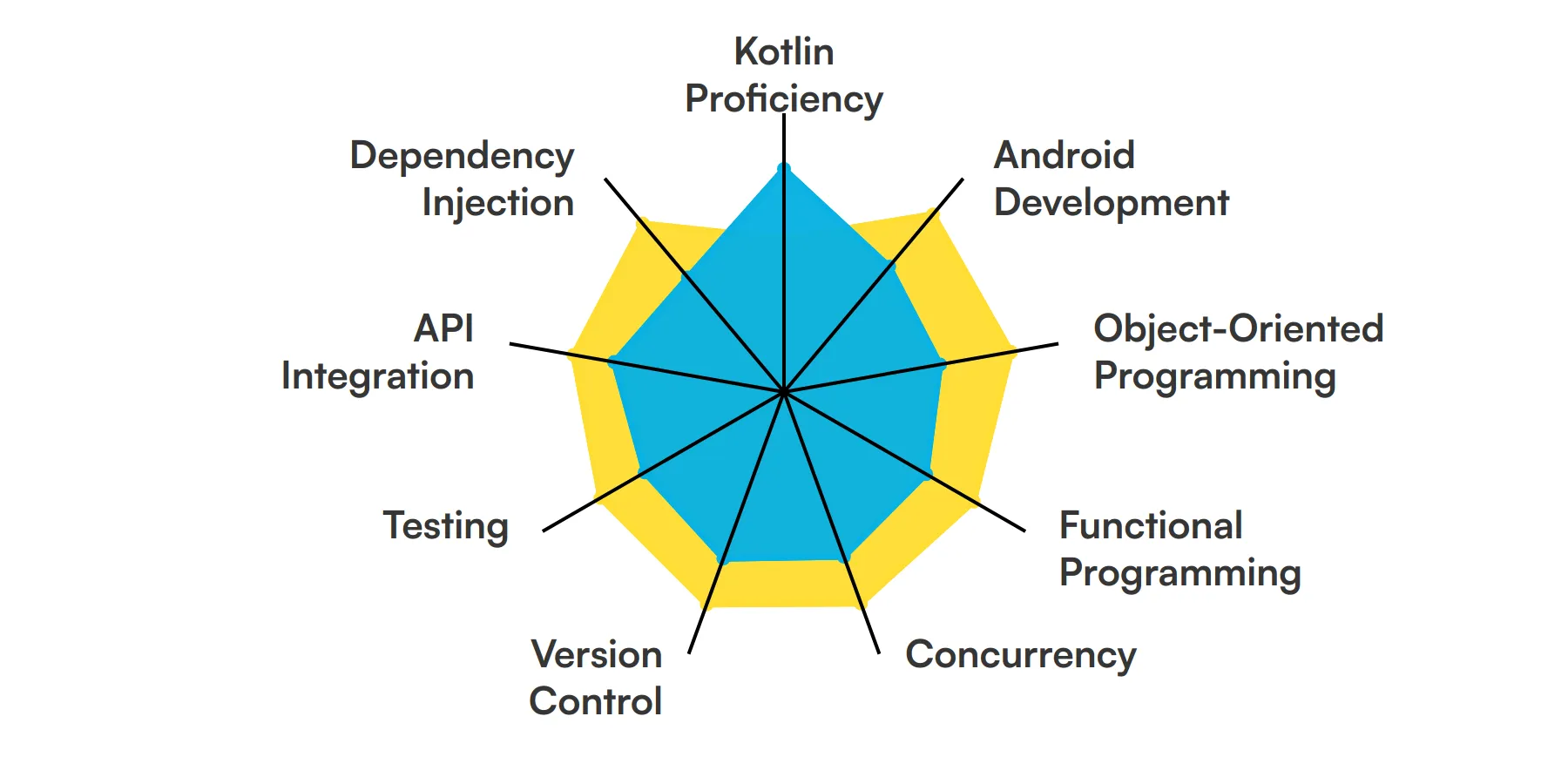
Kotlin Proficiency
A Kotlin developer must have a deep understanding of the Kotlin language, including its syntax, features, and best practices. This skill is fundamental for writing clean, efficient, and maintainable code in Kotlin-based projects.
For more insights, check out our guide to writing a Kotlin Developer Job Description.
Android Development
Since Kotlin is the preferred language for Android development, a Kotlin developer should be well-versed in building Android applications. This includes knowledge of Android SDK, UI/UX design principles, and integrating third-party libraries.
Object-Oriented Programming
Understanding object-oriented programming (OOP) concepts is crucial for a Kotlin developer. This includes knowledge of classes, objects, inheritance, polymorphism, and encapsulation, which are essential for designing robust and scalable applications.
Check out our guide for a comprehensive list of interview questions.
Functional Programming
Kotlin supports functional programming paradigms, so a developer should be familiar with concepts like higher-order functions, lambda expressions, and immutability. This skill helps in writing concise and expressive code.
Concurrency
Concurrency is important for building responsive applications. A Kotlin developer should understand coroutines and other concurrency mechanisms in Kotlin to handle asynchronous tasks efficiently.
Version Control
Proficiency with version control systems like Git is essential for a Kotlin developer. This skill is necessary for managing code changes, collaborating with team members, and maintaining a history of project development.
Testing
A Kotlin developer should be skilled in writing unit tests and integration tests. Knowledge of testing frameworks like JUnit and Mockito ensures that the code is reliable and bug-free.
API Integration
Integrating APIs is a common task for a Kotlin developer. This involves understanding RESTful services, handling JSON data, and using libraries like Retrofit to communicate with backend services.
Dependency Injection
Knowledge of dependency injection frameworks like Dagger or Koin is important for a Kotlin developer. This skill helps in managing dependencies and promoting a modular and testable codebase.
10 secondary Kotlin Developer skills and traits
The best skills for Kotlin Developers include SQL Databases, UI/UX Design, Networking, Agile Methodologies, Cloud Services, Security Best Practices, Performance Optimization, Continuous Integration, Code Review and Debugging.
Let’s dive into the details by examining the 10 secondary skills of a Kotlin Developer.
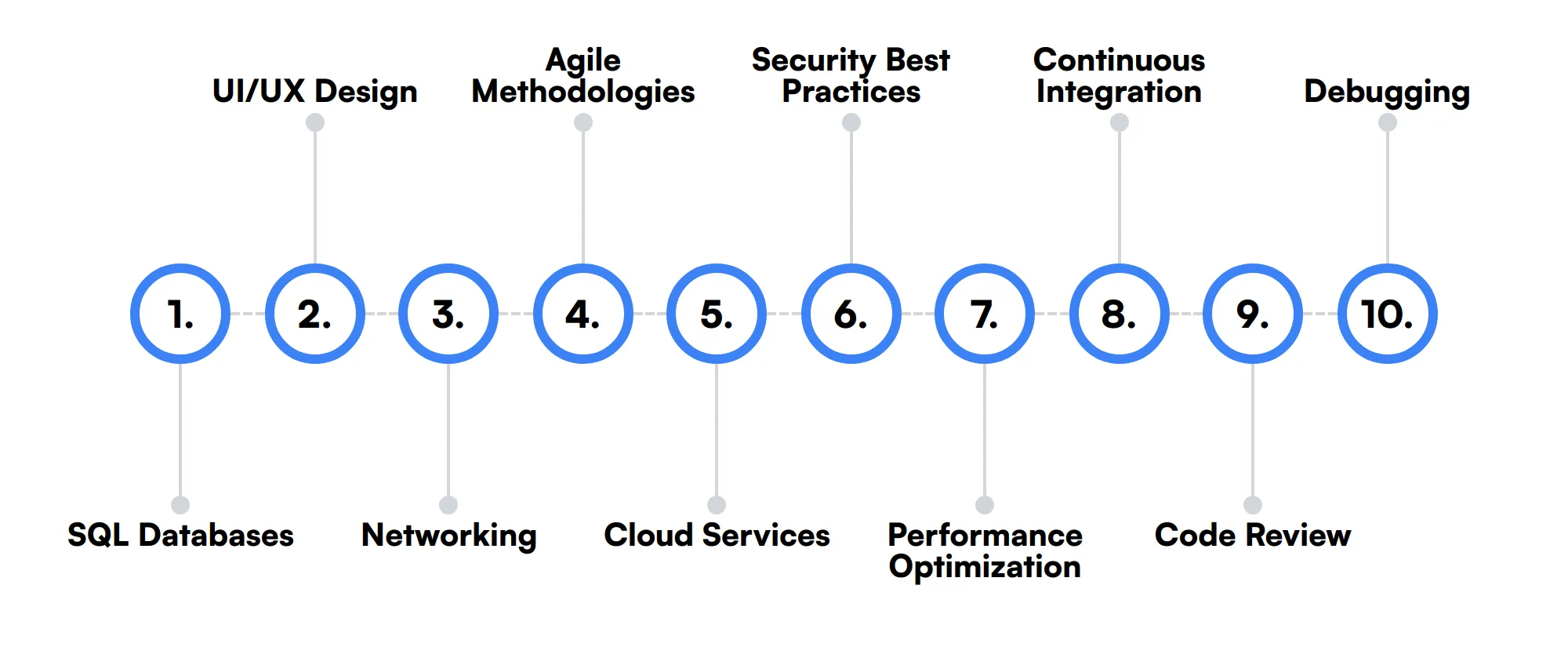
SQL Databases
Understanding SQL and working with databases like SQLite or Room is beneficial for a Kotlin developer. This skill is useful for managing data storage and retrieval in applications.
UI/UX Design
Basic knowledge of UI/UX design principles can help a Kotlin developer create intuitive and user-friendly interfaces. This includes understanding layout design, color theory, and user interaction patterns.
Networking
Familiarity with networking concepts and protocols is useful for a Kotlin developer. This includes understanding HTTP, WebSockets, and handling network requests and responses.
Agile Methodologies
Experience with Agile methodologies like Scrum or Kanban can help a Kotlin developer work efficiently in a team. This involves understanding sprints, backlogs, and continuous integration/continuous deployment (CI/CD) practices.
Cloud Services
Knowledge of cloud services like AWS, Google Cloud, or Firebase can be advantageous for a Kotlin developer. This skill is useful for deploying applications, managing databases, and using cloud-based APIs.
Security Best Practices
Understanding security best practices is important for a Kotlin developer to protect applications from vulnerabilities. This includes knowledge of encryption, authentication, and secure coding practices.
Performance Optimization
A Kotlin developer should be aware of performance optimization techniques. This includes profiling applications, identifying bottlenecks, and optimizing code for better performance.
Continuous Integration
Familiarity with continuous integration tools like Jenkins or GitHub Actions can help a Kotlin developer automate the build and deployment process. This ensures that code changes are tested and deployed efficiently.
Code Review
Participating in code reviews is an important skill for a Kotlin developer. This involves reviewing peers' code for quality, providing constructive feedback, and ensuring adherence to coding standards.
Debugging
Strong debugging skills are essential for a Kotlin developer to identify and fix issues in the code. This includes using debugging tools, analyzing logs, and understanding stack traces.
How to assess Kotlin Developer skills and traits
Assessing the skills and traits of a Kotlin developer involves more than just glancing at their resume. It's about understanding how well they can apply their knowledge of Kotlin, along with other essential skills such as Android development, object-oriented and functional programming, to real-world problems.
While technical prowess in areas like concurrency, version control, testing, API integration, and dependency injection is measurable, the true test comes in seeing these skills in action. This is where practical assessments play a significant role. By using tailored assessments, you can observe a candidate's ability to solve problems and integrate various aspects of Kotlin development seamlessly.
One effective way to streamline this process is through Adaface assessments, which are designed to mirror the complexity and nuance of real-world programming tasks. These assessments help in significantly reducing the screening time, with companies experiencing up to an 85% reduction in time spent filtering candidates. For a detailed look at how Adaface can transform your hiring process, visit Adaface assessments.
Let’s look at how to assess Kotlin Developer skills with these 6 talent assessments.
Kotlin Online Test
Kotlin Online Test evaluates a candidate's ability to use Kotlin basics, collections, and object-oriented programming to develop null-safe, concise, and readable Kotlin code.
The test assesses their understanding of Kotlin basics (Variables, Strings, Functions), Kotlin collections (Lists, Sets, Maps, Iterators), and Object-Oriented Programming (Classes, Inheritance). It also evaluates skills in reading and writing files, standard functions (apply, let, with, run), and asynchronous programming (Coroutines).
Successful candidates demonstrate proficiency in extension functions, working with APIs, and adding dependencies. The test includes coding questions to evaluate hands-on Kotlin programming skills.
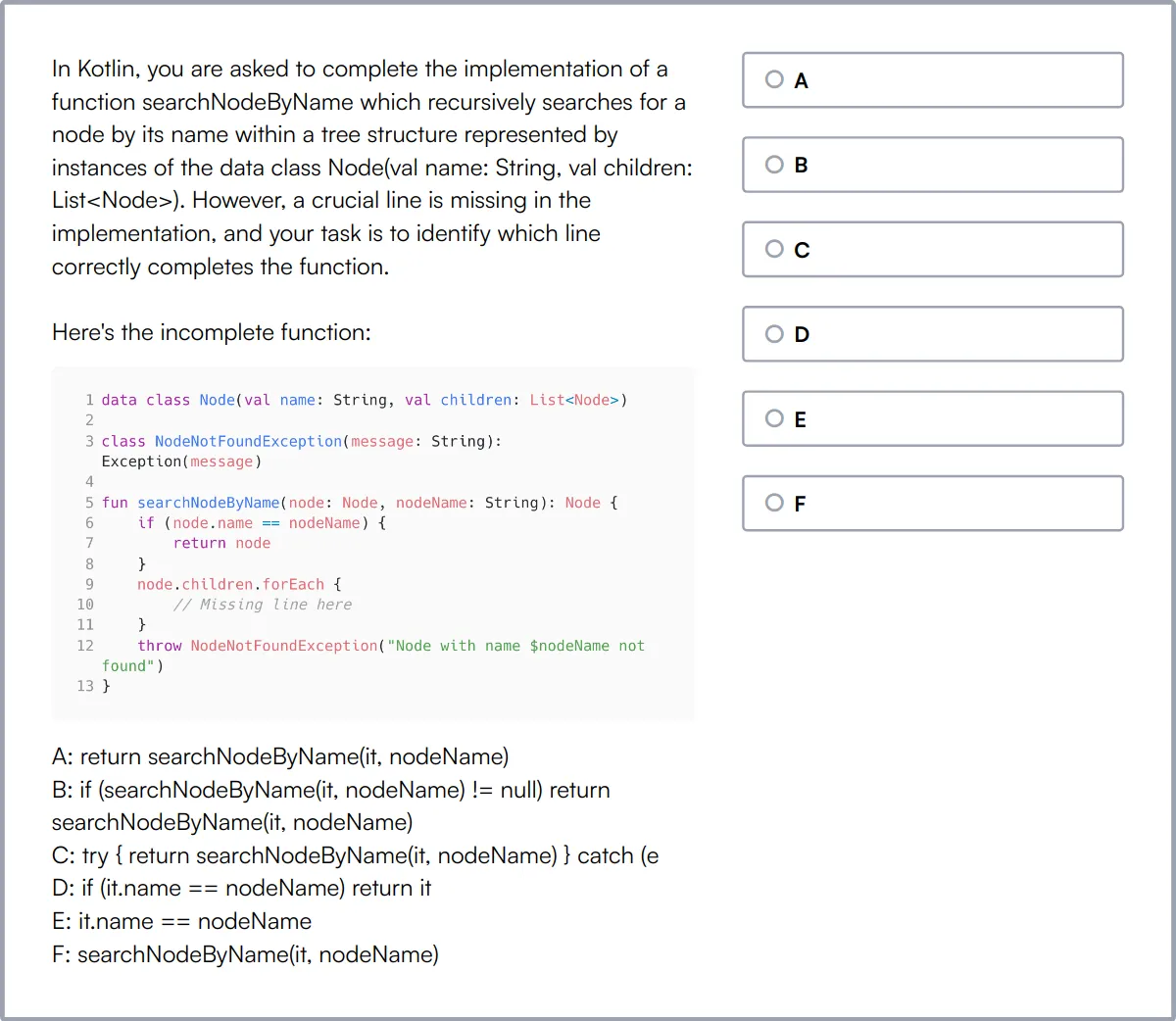
Android Online Test
Android Online Test evaluates a candidate's ability to design Android user interfaces, implement navigation strategies, and use themes and styles.
The test assesses their understanding of Android core (Activities, Layouts, Views), user experience design (Lifecycle, Navigation), and handling user interactions. It also evaluates skills in background tasks and triggers, MVP/MVVM architecture, and data management (Shared preferences, SQLite, Room).
Candidates are tested on advanced components (Fragments, Widgets, Sensors), exception handling, and performance optimizations. The test includes coding questions to evaluate hands-on Java or Kotlin programming skills.
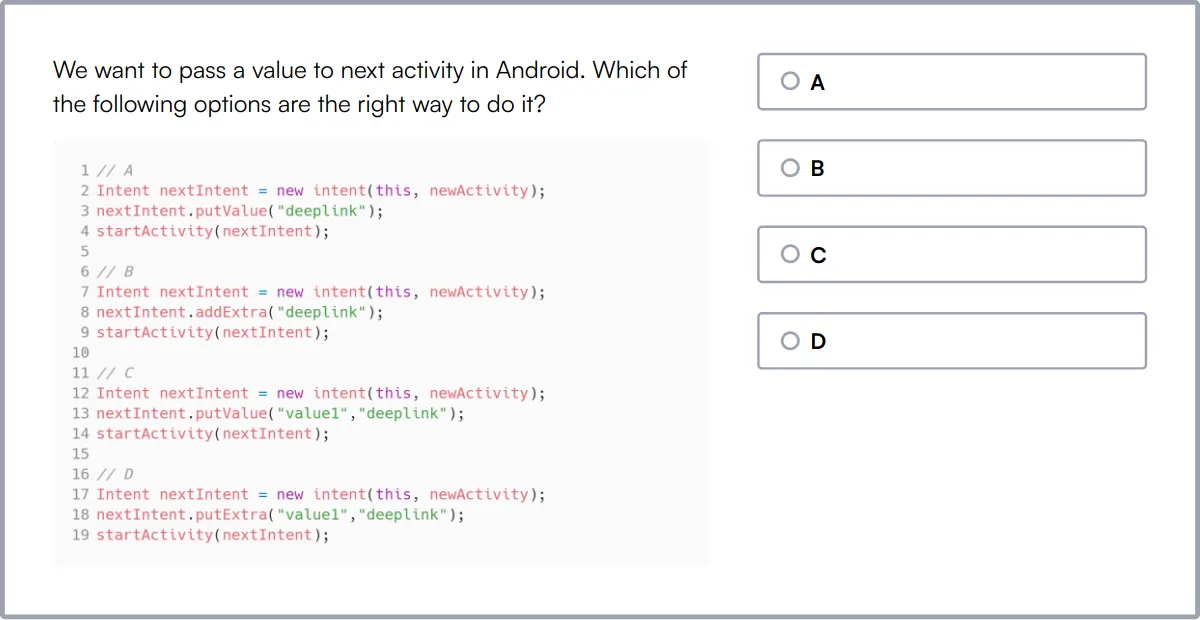
Loadrunner Online Test
Loadrunner Online Test evaluates a candidate's knowledge and skills in using Loadrunner, a performance testing tool for web applications.
The test assesses their understanding of Loadrunner basics, scripting and scenarios, and load testing concepts. It also evaluates skills in performance monitoring and analysis, script enhancement and customization, and parameterization and correlation.
Candidates are tested on think time and pacing, response time and throughput, and error handling and debugging. The test includes multiple-choice questions to evaluate these skills.
Git Online Test
Git Online Test evaluates candidates on their understanding of Git, a popular version control system.
The test assesses their knowledge of Git basics, repository creation, and branching and merging. It also evaluates skills in committing changes, conflict resolution, and remote repositories.
Candidates are tested on rebasing, Git workflows, and Git branching models. The test includes scenario-based multiple-choice questions to evaluate these skills.
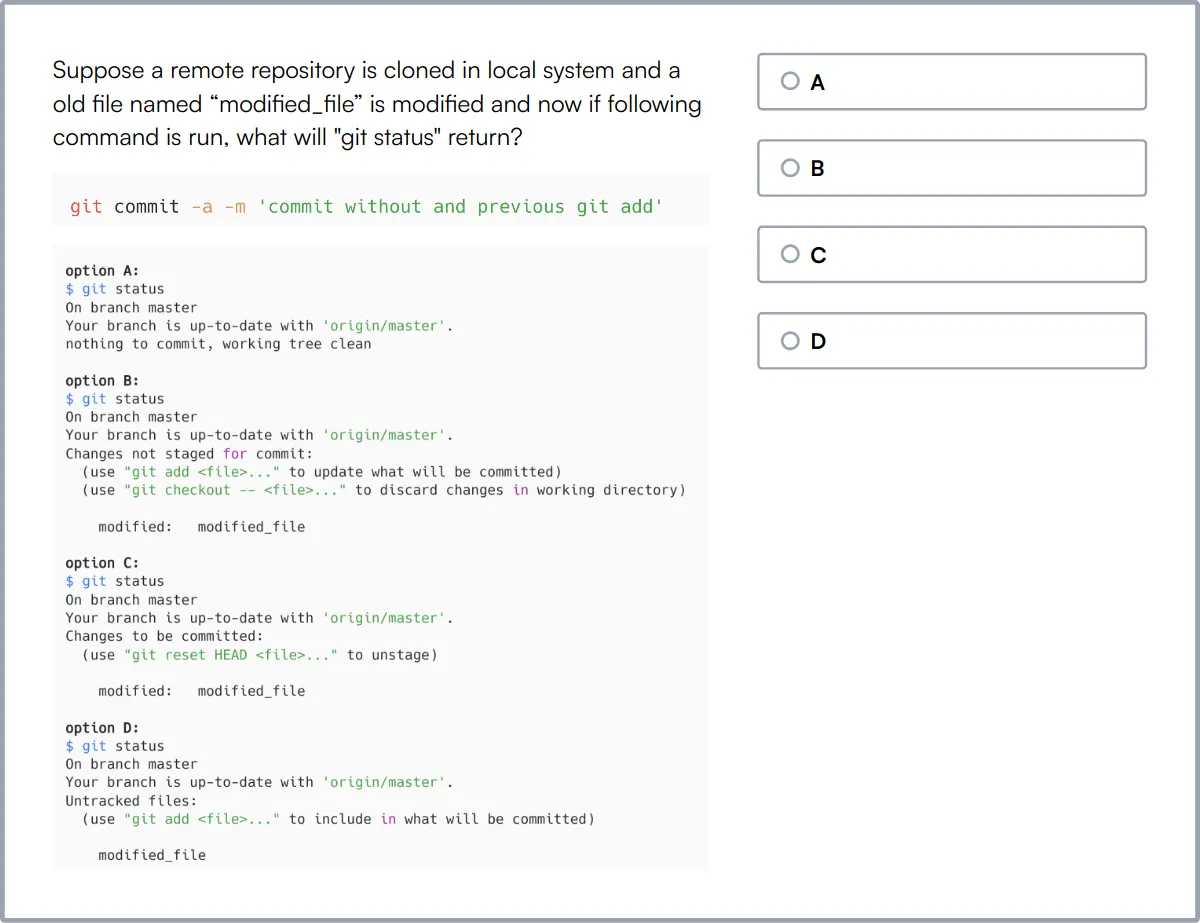
QA Engineer Test
QA Engineer Test evaluates candidates on their understanding of various testing methodologies, test planning and execution, and test automation frameworks.
The test assesses their knowledge of Quality Assurance (QA), testing fundamentals, and test design techniques. It also evaluates skills in software life cycle, QA programming, and program testing.
Candidates are tested on Selenium fundamentals, Linux fundamentals, and regression testing. The test includes multiple-choice questions and a coding question to evaluate these skills.
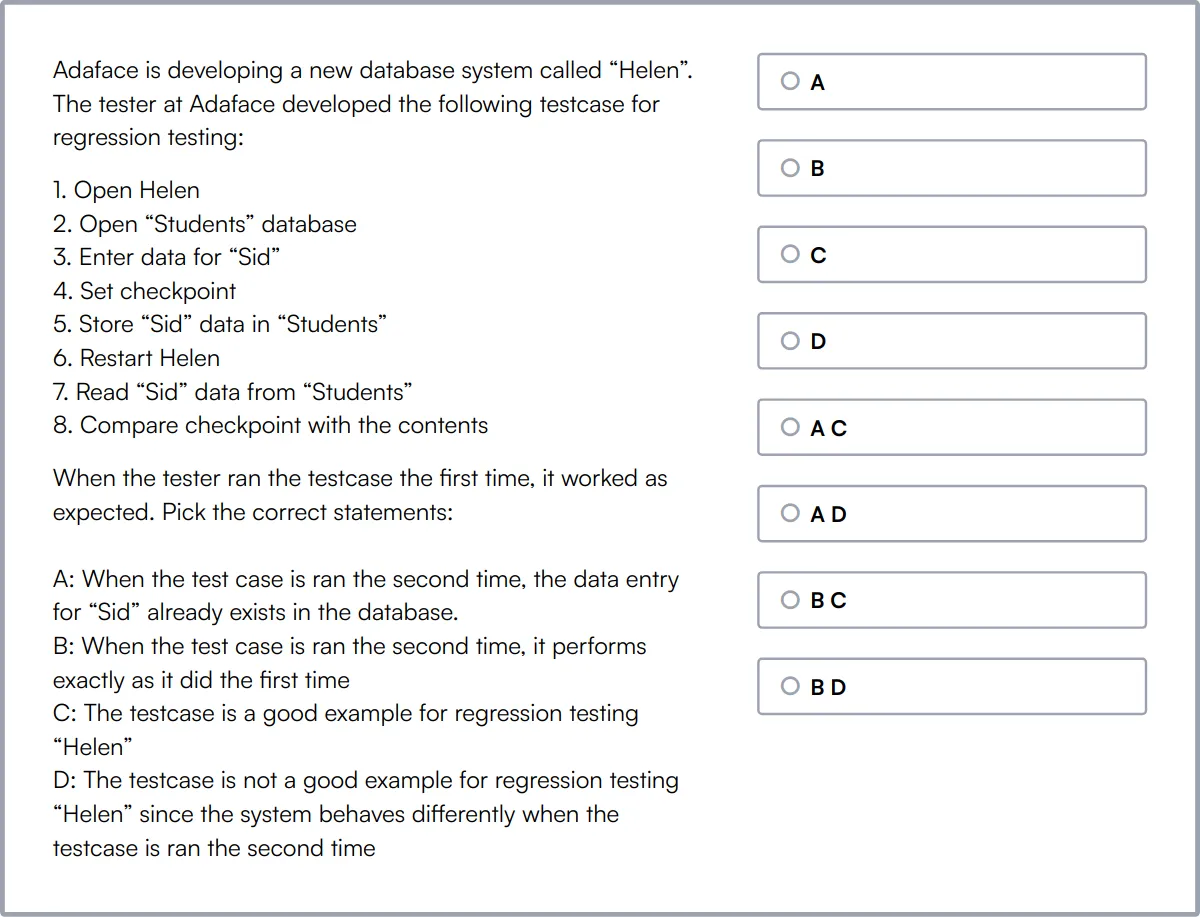
REST API Test
REST API Test evaluates a candidate's understanding of RESTful APIs and their ability to create, interact, and test them.
The test assesses their knowledge of REST API basics, API integrations, and API design. It also evaluates skills in best practices, designing backend services, and coding.
Candidates are tested on HTTP methods, status codes, and authentication. The test includes multiple-choice questions and a coding question to evaluate these skills.
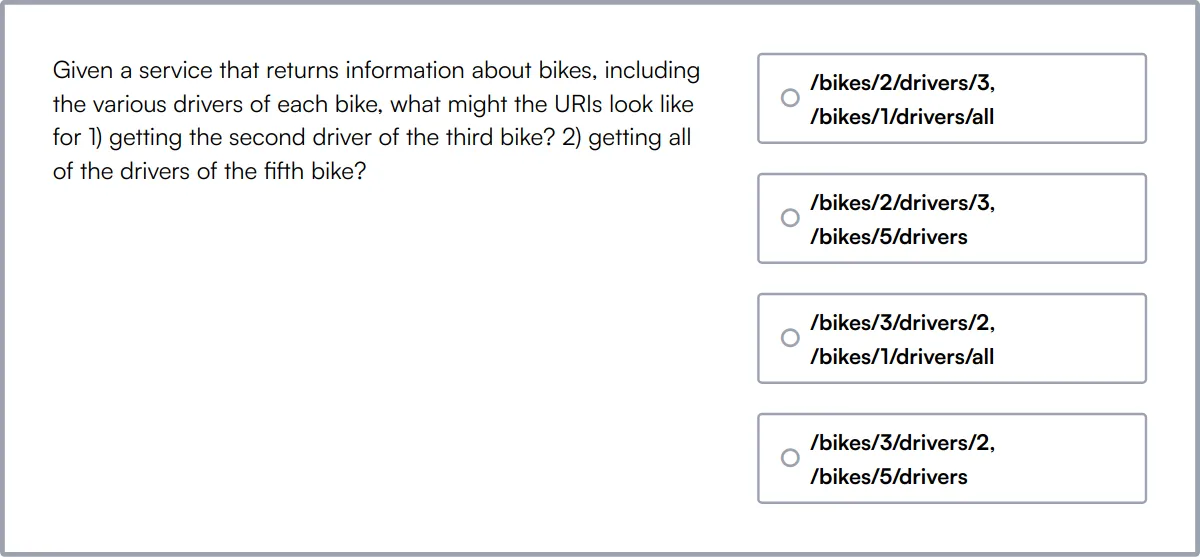
Summary: The 9 key Kotlin Developer skills and how to test for them
| Kotlin Developer skill | How to assess them |
|---|---|
| 1. Kotlin Proficiency | Evaluate the ability to write clean, idiomatic Kotlin code. |
| 2. Android Development | Assess experience in building and maintaining Android applications. |
| 3. Object-Oriented Programming | Check understanding of OOP principles and their application. |
| 4. Functional Programming | Gauge knowledge of functional programming concepts in Kotlin. |
| 5. Concurrency | Determine skills in managing concurrent tasks and threads. |
| 6. Version Control | Review proficiency in using Git for code versioning. |
| 7. Testing | Evaluate the ability to write and execute unit and integration tests. |
| 8. API Integration | Assess experience in integrating and consuming APIs. |
| 9. Dependency Injection | Check understanding and implementation of dependency injection frameworks. |
Kotlin Online Test
Kotlin Developer skills FAQs
What are the key skills to look for in a Kotlin Developer?
Key skills include Kotlin proficiency, Android development, object-oriented and functional programming, concurrency, version control, and testing.
How can I assess a candidate's Kotlin proficiency?
Assess Kotlin proficiency through coding tests, technical interviews, and reviewing their contributions to open-source projects or personal repositories.
Why is Android development experience important for Kotlin developers?
Kotlin is the preferred language for Android development. Experience in this area ensures the candidate can build and maintain Android applications effectively.
What methods can be used to evaluate a candidate's understanding of object-oriented programming?
Use technical interviews, coding challenges, and discussions about design patterns and principles to evaluate their understanding of object-oriented programming.
How do you test a developer's skills in functional programming?
Assess functional programming skills through coding exercises that require the use of higher-order functions, immutability, and pure functions.
What is the importance of version control knowledge for Kotlin developers?
Version control, especially Git, is essential for collaboration and maintaining code history. Assess this through practical tasks and questions about branching and merging.
How can you evaluate a candidate's experience with API integration?
Review their past projects, ask them to explain how they integrated APIs, and give them a practical task to integrate a sample API.
What are effective ways to assess debugging skills in Kotlin developers?
Present them with a buggy code snippet and ask them to identify and fix the issues. Discuss their approach to debugging and problem-solving.
Assess and hire the best Kotlin Developers with Adaface
Assessing and finding the best Kotlin Developer is quick and easy when you use talent assessments. You can check out our product tour, sign up for our free plan to see talent assessments in action or view the demo here:

40 min skill tests.
No trick questions.
Accurate shortlisting.
We make it easy for you to find the best candidates in your pipeline with a 40 min skills test.
Try for freeRelated posts
Free resources



